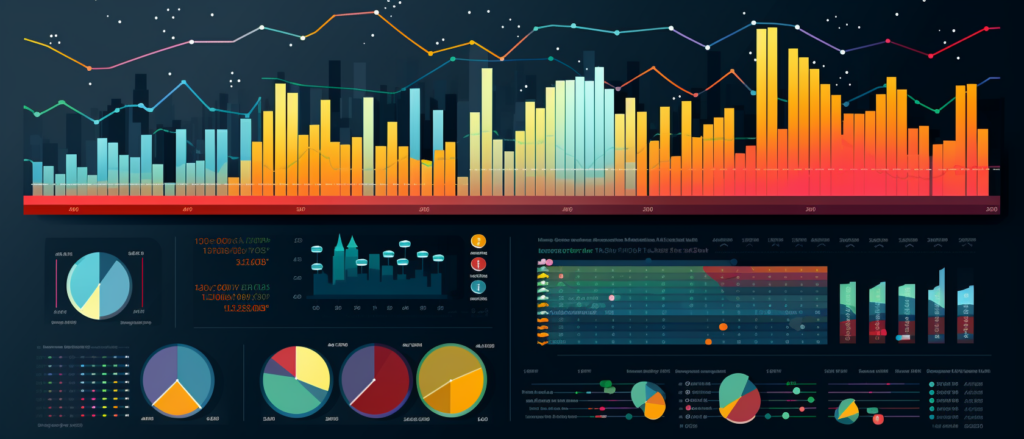Key Takeaways
✅ Integration of Web Analytics: Embrace web analytics tools as they are instrumental in capturing and interpreting user data. This information is critical in understanding customer journeys, optimizing user experience, and tracking the performance of marketing campaigns.
✅ Data-Driven Culture: Foster a data-driven culture within your organization. Encourage the use of analytics across all departments to ensure that marketing strategies are aligned with real-world data, leading to more informed decisions and better business outcomes.
✅ Continuous Learning and Adaptation: Stay abreast of the latest tools, technologies, and best practices in marketing analytics. The field is rapidly evolving, and continuous learning is essential to maintain a competitive advantage. By adapting to new analytics strategies, businesses can anticipate market trends and adjust their marketing tactics accordingly.
Introduction
Are you ready to unlock the full potential of your marketing strategies? Advanced marketing analytics is the magic key to understanding your customers like never before, steering your business towards unprecedented success. Imagine being able to peek into the minds of your audience, tailoring your efforts to perfectly fit their desires, and watching your business metrics soar as a result.
With an expansive array of powerful tools and cutting-edge strategies at your disposal, the data-driven world is your oyster. Join us on this enlightening journey through the intricacies of advanced marketing analytics as we delve into web analytics tools and more, paving your way to a future where every decision you make is backed by solid, actionable data.
Data-Driven Decision Making
With the majority of companies turning to data-driven decision making, it's clear that utilizing advanced marketing analytics is no longer optional for competitive businesses. By leveraging the insights gleaned from comprehensive data analysis, businesses can:
- Tailor marketing campaigns to address specific audience needs
- Optimize product offers and pricing strategies
- Identify and capitalize on emerging market trends
ROI and Revenue Growth
Advanced analytics techniques have demonstrated a direct impact on ROI and revenue growth. By investing in these technologies, businesses can expect:
- A significant return on every dollar invested in marketing analytics
- An increase in customer engagement and acquisition
- Higher revenue growth rates, up to 10% more than companies not employing advanced analytics
Customer Engagement
A focus on advanced analytics not only boosts revenue but also greatly enhances customer engagement by:
- Creating hyper-personalized marketing messages
- Predicting customer behaviors and preferences
- Providing a seamless customer experience across multiple touchpoints
Machine Learning and Predictive Analytics
The incorporation of ML and predictive analytics in marketing strategies allows companies to:
- Process and interpret complex data sets more efficiently
- Forecast consumer behaviors and market trends with greater accuracy
- Automate routine analytical tasks, allowing marketers to focus on strategy.
Marketing Mix Modeling
This analytical approach helps in understanding the contribution of each marketing input on sales and:
- Allocates marketing budgets more effectively
- Measures the impact of various marketing channels on overall performance
- Adjusts marketing strategies to maximize ROI
Multi-Channel Attribution
In the current multi-touchpoint customer journey, advanced analytics can illuminate the path to purchase:
- Tracks the customer journey across various channels
- Determines the impact of each touchpoint
- Optimizes marketing efforts based on the most influential interactions
Real-Time Analytics
To keep up with the pace of the digital marketplace, real-time analytics are essential for:
- Monitoring marketing campaign performance as it happens
- Engaging with customers at the most opportune times
- Making swift adjustments to campaigns to enhance outcomes
Social Media and Sentiment Analysis
With the pervasive influence of social media, sentiment analysis has become a critical tool to:
- Gauge public opinion and brand perception
- Identify brand advocates and address detractors
- Tailor content to resonate with the emotional drivers of the target audience
Advanced Customer Segmentation
Beyond basic demographics, advanced analytics enables granular customer segmentation by:
- Analyzing behavioral data and purchase history
- Grouping customers based on predicted future behaviors
- Customizing marketing messages to each unique segment
Competitive Intelligence
Advanced analytics also extend to the realm of competitive intelligence by:
- Monitoring competitor activities and strategies
- Benchmarking performance against industry standards
- Identifying opportunities for differentiation and competitive advantage
Training and Adoption
For advanced marketing analytics to yield results, organizations must:
- Invest in training for staff to effectively use analytical tools
- Encourage adoption of data-driven culture across departments
- Continuously update skill sets to keep up with evolving technologies
These points illustrate the multifaceted benefits of embracing advanced marketing analytics. Aligning these sophisticated tools with strategic business goals can lead to improved customer relations, more effective use of marketing budgets, and ultimately, enhanced profitability and growth.
AI Marketing Engineers Recommendation
As organizations strive to optimize their marketing efforts, advanced analytics plays a crucial role in understanding consumer behavior, enhancing customer experiences, and driving business growth. With the vast amount of data available today, leveraging Artificial Intelligence (AI) within marketing allows for more precise predictions, personalization, and overall, smarter decision-making. Here’s a recommendation on how to harness the power of advanced marketing analytics:
Embrace Machine Learning Algorithms
Machine learning algorithms can analyze vast datasets much more efficiently than humans. Use AI to sift through your customer data, identifying patterns and predicting future behaviors. Predictive analytics can inform everything from personalized recommendations to forecasting sales trends.
Invest in Real-Time Data Processing
Integrate your systems with AI solutions that offer real-time data processing capabilities. This will enable you to provide immediate feedback to customers, optimize your campaigns in real-time, and react swiftly to market changes. Bolster your customer service and engagement by utilizing chatbots and AI-driven support systems that learn from each interaction.
Utilize Natural Language Processing (NLP)
The ability to understand and interpret human language through NLP is essential for social listening and sentiment analysis, allowing you to gain insights into how customers perceive your brand. Leverage NLP to analyze customer reviews, social media conversations, and support interactions to adapt your marketing strategies, messaging, and product development.
Explore Computer Vision
Computer Vision can transform how you engage with customers through visual content. For instance, if you’re in the retail industry, you can use AI-driven image recognition to offer customers recommendations based on products they view or to create immersive AR experiences.
Experiment with AI-Driven Content Creation
AI can now generate written content that resonates with your audience. Tools powered by sophisticated algorithms can craft personalized emails, create compelling ad copies, or even generate informative blog posts, saving valuable time and resources.
Focus on Customer Data Platforms (CDP)
Invest in a robust CDP that integrates with AI tools to unify customer data across multiple touchpoints. This provides a 360-degree view of the customer journey, enabling highly personalized marketing campaigns and improved customer experiences.
Implement Advanced Attribution Models
Move beyond the last-click attribution model by employing advanced AI-powered attribution models. This will provide a more accurate understanding of how each marketing channel and touchpoint contributes to conversions, allowing for more informed budget allocation and strategy refinement.
Monitor and Optimize Campaigns Automatically
AI can not only predict the success of marketing campaigns but also continually optimize them. By setting performance targets and parameters, AI systems can make autonomous adjustments to your campaigns, ensuring they perform at their best.
Continuous Education
Stay abreast of the latest developments in AI for marketing. Regularly attend workshops, webinars, and courses (online or in-person) to understand the evolving landscape of AI tools and methodologies.
Ethical and Privacy Considerations
Finally, while harnessing the power of AI, ensure that you respect and protect customer privacy. Be transparent about data collection and usage, and comply with GDPR, CCPA, and other relevant regulations.
By integrating these AI-enabled advanced marketing analytics techniques, AI Marketing Engineers will not just react to market trends, but anticipate them, providing an exceptional level of service that puts them ahead of the competition. Remember, though, that the power of AI is not just in the technology itself, but in the strategic implementation of that technology within the broader context of your marketing objectives.
Conclusion
The landscape of marketing has been revolutionized by the proliferation of advanced marketing analytics, enabling businesses to navigate the digital terrain with unprecedented precision and insight. Through the strategic application of advanced tools and methodologies, companies can now decode complex consumer data, translating it into actionable insights that fuel data-driven decisions.
The progression from traditional marketing methods to a more analytical approach is not just a trend but a paradigm shift, ensuring those who leverage marketing analytics effectively gain a competitive edge. In an era where every interaction, transaction, and engagement leaves a digital trace, understanding and utilizing advanced marketing analytics is not just advantageous, it's imperative for success.
FAQs
Traditional marketing analytics involves using basic metrics such as impressions, clicks, and conversion rates to measure campaign performance. Advanced marketing analytics goes beyond these metrics to use more sophisticated techniques such as machine learning, predictive analytics, and big data analytics to gain deeper insights.
Advanced marketing analytics can help you to understand consumer behavior by analyzing large amounts of data to identify patterns and trends. This can help you to develop personalized marketing campaigns that are more effective in engaging with your target audience.
Advanced marketing analytics can help you to measure the return on investment (ROI) of your marketing campaigns by analyzing key performance indicators (KPIs) and using models such as predictive analytics to forecast future outcomes.
Advanced marketing analytics can help you to optimize your marketing campaigns by using A/B testing and multivariate testing to experiment with different variables and identify the most effective strategies.
To ensure the accuracy of your advanced marketing analytics, you should use high-quality data, choose the right analytics techniques, and use a rigorous testing and validation process.
Machine learning plays a key role in advanced marketing analytics by enabling you to analyze large amounts of data and identify patterns and trends that would be difficult to identify using traditional methods.
Advanced marketing analytics can help you to stay ahead of the competition by providing you with a deeper understanding of consumer behavior, allowing you to develop more effective marketing campaigns, and giving you a competitive advantage through predictive analytics.















